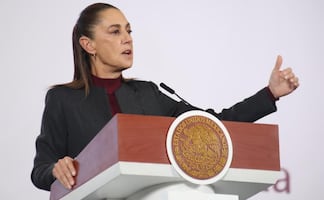Más Información

Sheinbaum no descarta abrir puente aéreo para enviar ayuda a Cuba; dice que no hay restricción de vuelos a la isla

La mexicana Elma Correa gana el Premio Biblioteca Breve 2026 con una novela sobre amistad y violencia en la frontera

"Cuando AMLO se radicalizó, tuve que renunciar a su gobierno; no me siento traicionado por el expresidente", afirma Julio Scherer
Now that Mexico is approaching half a million infections and 55,000 deaths from coronavirus, the government mismanagement of the pandemic is evident. To assess the scale of the disaster, it does nothing more than to give an account of the shocking figures that have led the country to occupy the not honourable third place in the number of deaths. And that considering only the official statistics. The under-registration, officially accepted, could be three times that amount.
Just a few weeks before the start of the federal electoral process next year, constitutionally established in September and taking place in June 2021, the question about how the pandemic will affect the elections is becoming increasingly relevant. Part of the debate has focused on operational difficulties for voting. The safe distance measures, the limitation of capacity in closed spaces and the obligation to wear face masks and other protection measures pose challenges never before experienced in the country.
At a global level, different countries have already gone through these processes from which it will be possible to return to the best practices and lessons learned that will allow Mexico to solve difficulties successfully. However, the coronavirus has also changed the way campaigns are run. Can you convince voters from afar? Can you campaign without contact? Can you have events with 30% capacity?
Perhaps the obligatory reference for Mexico is the United States, both due to its geographic, economic and commercial proximity. The November could mean a substantial change or the continuity at the head of a populist like Trump. Just three months after the election in the United States, uncertainty and instability have taken over the public scene, making this process completely different from what has been experienced before, especially in the campaign.
These days, the use of face masks and keeping one's distance has become a political reference of responsibility. The politician who does not use them is harshly criticized as has happened with the three leaders who lead the nations most affected by the lethality of the virus : Trump in the United States, Bolsonaro in Brazil, and López Obrador in Mexico.
For those who face Trump in November or the ruling Morena party in Mexico in June, the dilemma will be just whether or not to comply with that expected responsibility. And the equation is not simple at all. Campaigns in Mexico require closeness with people, physical contact, that they live and that they also advertise. That through traditional and digital media, people see that many support that candidate. However, political responsibility requires that this is not done, that the campaign be responsible, that crowds and proximity be avoided. For López Obrador, there is no dilemma. He does what he wants and does not wear a mask because he is less afraid of contagion than the possibility of losing the election. So neither he nor Morena's candidates will be held accountable. What will opposition candidates do then? How much will what they do impact the electoral result? What will the public think is more important? They are not idle questions, and they are not too forward questions. The electoral process in Mexico will be severely affected, and it is time for the opposition to begin to debate this internally if they seek to wrest the majority in Congress from Morena and his allies.
sg
Noticias según tus intereses
[Publicidad]
[Publicidad]











